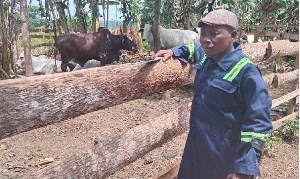When I first heard the Hon Minister of Education's statement that young kids must be taught in their first language, I was shocked and wondered why on earth the learned Prof would make these recommendations.
Then, I reminded myself that I cannot be more knowledgeable than the Prof on matters about Education. Let me keep quiet, go and read more before making an informed comment on this matter.
I spent some minutes reading about this issue and trying to understand the Hon. Minister. My quick research taught me that there is indeed a good body of evidence supporting the benefits of teaching young kids in their first languages or their mother tongue. So, YES, I did come across evidence supporting the recommendations of the Hon. Minister of Education. I acknowledge that what the Hon Minster said is backed by evidence.
But is evidence alone enough to justify the promotion of a policy?
There are a few questions I wish to humbly ask the Hon. Minister of Education. The implementation of this policy should be viewed within a broader context of many other inter-related issues. We can only decide on its feasibility after we have analysed issues more broadly. In this regard, I have a few questions for the Hon. Minister.
TEACHING: There is a difference between speaking a language and being able to teach in the language. Would we be training all our teachers in our local languages to make sure they are well equipped to teach in the local languages?
WHICH LANGUAGES WILL BE USED: There are about 80 languages or so spoken in Ghana. The dominant languages in different regions/cities/towns may include Dagbani, Frafra, Akuapim, Twi, Fante, Nzema, Ga, Ewe, etc. My question is………would we do a mapping of Ghana in order to select the dominant language per each area?
TEACHING MATERIAL: For teaching to be effective, there must be supporting educational materials. Do we have the education material in different languages? Are we planning to develop education material in Dagbani, Frafra, Akuapim, Twi, Fante, Nzema, Ga, Ewe, etc?
LANGUAGE FLEXIBILITY/VERSATILITY: Do our languages have words for all the science terms? What about terms in other subjects? Okay, how do we say twitter or social media in Ewe or Twi for example?
TRANSFER OF TEACHERS: How would this proposed policy impact on the transfer of teachers? This would mean we would have to transfer only teachers who speak a particular language to particular regions/cities/locations, right? This also means we will not transfer teachers who speak the dominant language from their locations right?
HETEROGENOUS POPULATIONS IN CITIES/TOWNS: In some cities/towns in Ghana, even though there may be a dominant language, there are also many people who are not from those cities or towns and as such, speak other languages. Which language would be selected in such areas? For example, which language would be selected in Accra?
EFFECT ON SPOKEN ENGLISH: We often complain about the poor spoken and written English by graduates who started learning English at a very early age. We complain about the poor quality of application letters written by graduates from our tertiary institutions. My question is…..if we are unhappy with the quality of spoken and written English by students who started learning English early, what do you think would be the consequence of delaying the teaching of English by 4 or so years? Are we not likely to make a bad situation worse?
POTENTIAL TO WIDEN INEQUALITY: We currently complain about the wide gap between our public and private schools especially the international schools. Is there not a threat that this policy would widen this gap further?
EFFECT ON TRANSFERS: So, I work in Accra and I am posted to Tamale, where Dagbani is spoken. My children will have to study in Dagbani but that is not their mother tongue or first language. Would I be happy to take up the job in Tamale or am I likely to reject being posted to other parts of Ghana where the dominant language is different from my mother tongue?
CHALLENGES WITH THE IMPLEMENTATION OF THE JSS/SSS PROGRAMME: We still have not recovered from the poor implementation of the JSS/SS system and would it not be better to focus and concentrate on improving the system rather than attempting another experiment?
COST OF IMPLEMENTATION: How much would it cost our nation to implement this policy? Before we actively promote a policy we must have an idea of the cost implications. This will allow us to do a good cost-benefit analysis. Please tell me how much the implementation of this policy would cost us?
Dear Hon. Minister, I believe in our Ghanaian languages. I speak two-and-a-quarter Ghanaian languages. I believe we must all endeavour to teach our children Ghanaian languages but this is very different from using Ghanaian languages as a medium of communication in our schools.
The fact that there is some evidence to back the benefits of learning in one’s mother tongue does not mean it should be implemented as a national policy.
Instead let’s take advantage of all the IT around us to revolutionize our educational system. For instance, would it be possible for the lessons in a school like PRESEC to be beamed electronically to other less privileged schools so that they can have access to the same quality of education, PRESECANS have or any other good school has? We all have access to the internet so how can we make some of the applications (learning aids) available to our kids to put them on par with kids in other countries? How can we review our teaching methods in order to make them more interactive and less of “chew pour pass and forget”? How can we close the gap between real life problems in our country and our academic studies? For instance, should the Civil Engineering Department of KNUST be made directly responsible for maintaining some of the roads in the Kumasi Metropolis? I have many more questions on my mind and I sincerely think there are many other educational priorities we should have as a nation.
In conclusion, I wish to say, let’s not confuse ourselves and our kids. Let’s not add to our current problems and challenges. Some of the countries in which this policy is being implemented have one or very few dominant languages. Hon. Minister, you spoke about Korea. Well, in Korea they speak the Korean language. In Ghana, we speak Dagbani, Frafra, Akuapim, Twi, Fante, Nzema, Ga, Ewe and many more. AS WE LEARN FROM THE EXPERIENCES OF OTHER COUNTRIES, LET’S RECOMMEND POLICIES WHICH ARE LIKELY TO BE FEASIBLE WITHIN OUR OWN CONTEXT. In my humble opinion, this is a distraction and potentially, a waste of time and resources. Let's use our limited resources more wisely.
I have heard the Hon. Minister talk about this policy a number of times and she may insist on implementing it. If this is the case, please commence the implementation in a few towns as a pilot project. This would allow you to learn a lot of valuable lessons which should inform the national implementation of the policy.
Thank you for reading,
Kofi Amekudzi
https://www.facebook.com/kofi.amekudzi?hc_location=ufi
Opinions of Thursday, 22 October 2015
Columnist: Kofi Amekudzi















